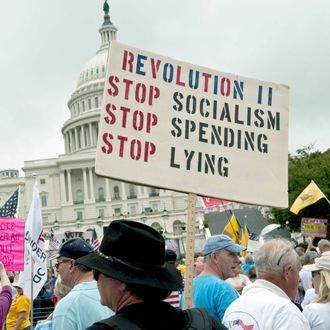
A common liberal line is that the tea party, which arose at a time when a black president was pushing through a big new social program designed largely to benefit low-income people, is really about race rather than the size of government or anything else. A new study in the American Sociological Review doesn’t quite prove that (if it’s even something that can be proven), but does highlight an interesting way in which race and tea-party-ism intersect.
[Lead author Rory] McVeigh and coauthors, Kraig Beyerlein, Burrel Vann and Priyamvada Trivedi, examine why certain U.S. counties are conducive to the establishment of Tea Party organizations. Their statistical analyses show that even after accounting for many other factors, Tea Party organizations were much more likely to form in counties with high levels of residential segregation based on education levels, and that college graduates were more likely to indicate support for the Tea Party if they resided in a county characterized by high levels of educational segregation.
“Acceptance or rejection of the Tea Party’s views on the government’s role in redistributing wealth is shaped, to a large degree, by the extent to which those who have benefited from higher education are set apart in their daily lives from those who have not,” says McVeigh, who specializes in inequality, social movements, race and ethnicity.
This ties a bit into the contact hypothesis — the idea that interacting with members of “outgroups” in certain productive ways can help reduce prejudice directed at them. White people in segregated communities — the tea party is overwhelmingly white — have almost no such contact, and that probably contributes to the persistence of false ideas about “undeserving” people getting welfare benefits.




